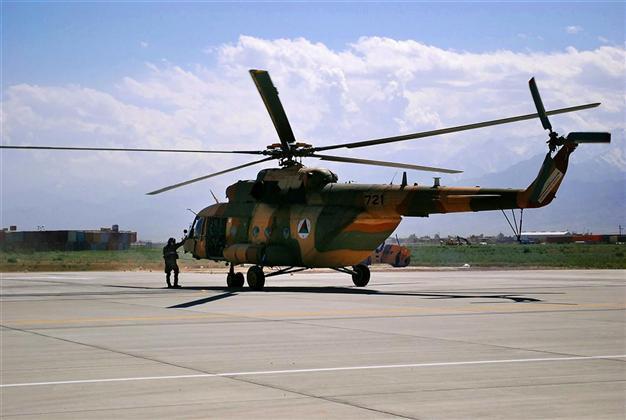Pentagon cancels plans to buy Russian helicopters
WASHINGTON - Reuters

This May 13, 2013 file photo shows a Mi-17 helicopter, used by the Afghan Air Force sitting on Bagram Air Field in Afghanistan. Sen. John Cornyn, R-Texas says the Defense Department is canceling plans to buy additional cargo helicopters from the Russian arms export agency that is a top supplier of weapons to Syria's military forces. AP Photo
The Pentagon no longer will buy Russian helicopters for the Afghan Air Force from Rosoboronexport, a state-owned arms exporter that also sells weapons to the government of Syrian President Bashar al-Assad, U.S. defense officials and a leading Senate opponent of such deals said Nov. 14.
The switch in Pentagon policy appears to end, at least for now, its plans to buy an additional 15 Russian Mi-17 helicopters for $345 million, sources familiar with the matter said.
"I applaud the Defense Department's decision to finally cancel its plan to buy additional helicopters from Rosoboronexport," Senator John Cornyn, Texas Republican, said in a statement.
"Doing business with the supplier of these helicopters has been a morally bankrupt policy, and as a nation, we should no longer be subsidizing Assad's war crimes," Cornyn said.
Defense Department spokeswoman Maureen Schumann said in an email: "After initially requesting funds from Congress in the FY14 (2014 fiscal year) budget to provide additional enhancements for the Afghan National Security Forces, the department has re-evaluated requirements in consultation with Congress."
"We currently do not have plans to purchase additional Mi17s from Rosoboronexport beyond those in the Afghan Program of Record," she said.
The Pentagon had planned to purchase 63 new Mi-17s from Rosoboronexport for nearly $1.1 billion, defense officials told Congress in August. It is unclear how many of those 63 have been delivered.
Senior Pentagon officials had previously defended the deals with Rosoboronexport - which were to total $1.1 billion over several years - as the fastest way to outfit the Afghan Air Force before most U.S. troops leave Afghanistan by the end of 2014.
But the Pentagon's relationship with the company and other foreign contractors involved in the program has faced bipartisan criticism in the U.S. Congress. Critics cited Rosoboronexport's deals with Syria; the helicopters' escalating costs; and federal procurement investigations involving the Russian helicopter project.
Reuters reported in August that the Defense Criminal Investigative Service had opened a criminal probe into the Huntsville, Alabama, Army aviation unit that oversees the Mi-17 program, and ties between the unit's former chief and two foreign subcontractors.
No charges have been filed in the case.
"The Army's mishandling of this arms program, as well as the Afghan military's inability to maintain the helicopters, further underscores why this contract should have been canceled long ago," Senator Richard Blumenthal, a Connecticut Democrat, said in a statement.
"I applaud (the Defense Department) for correcting this wrong, and hope the agency buys American in the future," added Blumenthal, whose state is home to helicopter manufacturer Sikorsky Aircraft, a division of United Technologies Corp.
Blumenthal said he plans to introduce legislation that would ban contracts "with foreign companies that enable war crimes in Syria."
Deputy Defense Secretary Ashton Carter called Cornyn last week to tell him the Pentagon was cancelling the additional helicopter purchases, according to a Senate aide who spoke on condition of anonymity.
It remains unclear whether the Pentagon has alternative plans to bolster the Afghan Air Force's capabilities to fight militants and drug trafficking.
A U.S. Army planning document, dated Nov. 6 and obtained by Reuters, shows that the service had planned to deliver a total of 30 Mi-17s for the Afghan Air Force's Special Mission Wing between now and Oct. 1, 2014.
